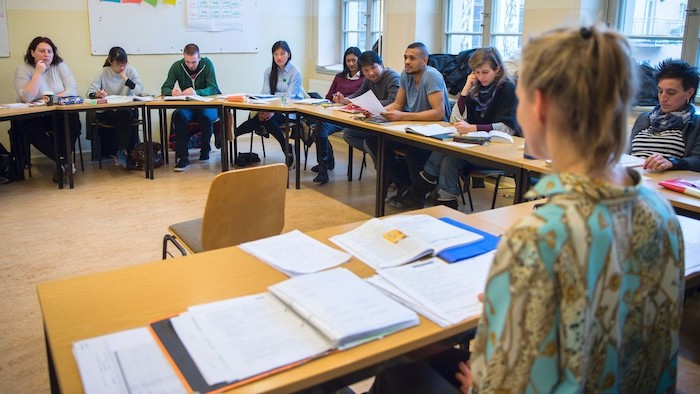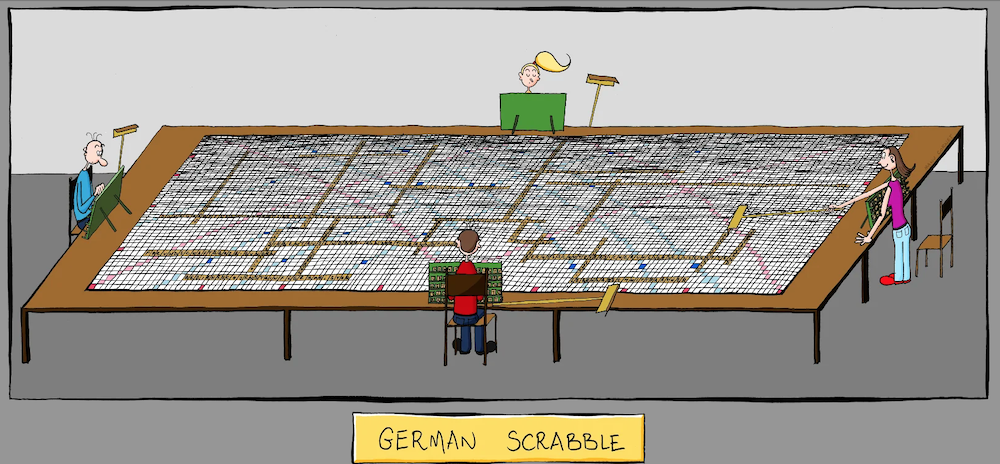Oscar Wilde famously said: “Life is too short to learn German.” If you’ve recently (or even not-so recently) relocated to Berlin, it’s very tempting to be seduced by his sentiment. Everyone here speaks English, many jobs available to expats require not much German and there’s a wonderful little bubble of people here who have little to no derring-do for Deutsch.
Regardless of whatever zone of linguistic comfort you might have happened upon, as time goes on, not knowing the mother tongue could start to feel not so cool.
• Isn’t it annoying to pay for a translator every time a dreaded appointment at Immigration comes up?
• Aren’t you tired of only knowing how to order coffee and say that you’d like to pay with a credit card
• Aren’t you curious to know the entirety of what someone yelled at you when you were accidentally walking in the bike lane?
You might one day find yourself having flickers of inspiration toward learning a language full of words that Mark Twain referred to in his essay “The Awful German Language” as “alphabetical processions.” But as soon as you even share a hint of interest, you could be met by instant discouragement from fellow expats, and even Germans themselves, all in firm agreement that “Deutsch ist schwer. Total schwer.” (“German is hard. Very hard.”)
But I’m here to tell you, fair Ausländer, don’t listen to Wilde, don’t listen to your whiny expat friends, and don’t listen to that guy who stopped studying after reaching only the upper beginner level because “it’s pointless.”
You can do it!

Tune out all the marketing noise
As an American who began learning with the Pimsleur App (highly recommended for beginners) in summer of 2020 before moving to Berlin later that year, and continued studying off and on while pursuing a masters degree, maintaining a job, a relationship and also pursuing stand-up comedy, I am happy to have recently reached level B2.2 (Upper Intermediate.)
I have taken a very slow approach to learning German partly because of life and work circumstances (I moved here during Covid for example). But one thing that really slowed my pace is simply not feeling good about where to take a course, especially when many are incredibly expensive.
In my quest to break through what seemed in the past like an incomprehensible wall of gibberish, I’ve used lots of apps, watched tons of interactive videos and taken loads of short courses at private language schools here in Berlin. Despite making solid progress on my own in the very beginner levels with good apps and videos, I found higher level private classes to be largely frustrating and often a waste of money.
For about a year, I really wanted to buckle down and get into a good class, but none really worked for me.
Advertisements for language courses in Berlin are in abundance, plastered on U Bahn stations and flickering in our social media feeds. Many courses are expertly marketed to soothe the predictable dread one has over the amount of time, training and practice it actually takes to understand basic things, like the entirety of a train station announcement.
Language schools offer courses that “fit your schedule” or are “designed for professionals” and even one-on-one tutoring. They all promise that their method of language learning is THE BEST and will somehow make learning German less difficult.
Phrases like “learn to communicate with the locals confidently in no time” and “move quickly toward fluency” are listed in re-assuring bullet points under pictures of people that look like they are having the absolute time of their lives learning German. One school even boasts that they have “vintage furniture,” pledging that “your comfort is our priority.”
Nothing takes the edge off of learning 200 irregular German verbs like a 1970s couch, right?

Affordable German schools ‘hiding in plain sight’
So many of these private language schools are selling their expensive classes by sugar coating the sobering truth: Learning German is hard and uncomfortable. It will take time, lots of time. It can be very difficult, and if you are already a working adult, it can feel like quite an undertaking to fit German school into your life.
My biggest deterrent was always the course fees. I often wondered, “isn’t there a place where I could learn German for free or super cheap? Like a community college?” As it turns out, there are 12 such institutions right here in Berlin, all hiding in plain sight.
Volkshochschule (VHS, literally the “people’s high school”) is simply the best and most affordable place to learn German in Berlin, but one could live here for years and not know it. VHS is not widely advertised, promises no “special learning techniques,” and requires an in-person placement exam and interview (all in German) to register, creating a bit of a potential hurdle for a nervous new arrival.
At a fraction of the price of the predominant institutions, VHS offers top notch instruction all over Berlin by teachers who are truly passionate about what they do. Most private schools give the feeling that they’re trying to sell you on their school and have a fair amount of obnoxious branding that is simply absent from VHS.
Compare prices!
Classes are thorough, energetic, provide a plethora of excellent course materials and are realistic with how much time it takes to learn the language. The best part of learning German at VHS though, is by far the price.
My most recent, 6 week, 78 hour, Upper Intermediate course set me back just 180 Euros.
That’s just 2.30 euros per hour of instruction. I used this figure to do some cost analysis research for many of Berlin’s most popular language schools and the results were fairly shocking.
Here’s what it would cost to achieve the same amount of in-person instruction at these popular language schools in Germany’s Hauptstadt:
• Goethe Institut: 1,532 euros
• GLS: 1,235 euros
• Expath: 654 euros
• Sprach Institut: 567 euros
•Sprachenatlier: 543 euros
• Kapital Zwei: 520 euros
• Speakeasy: 514 euros
These costs of course do not include course materials and other questionable “registration fees.” Prices like these could indeed induce one into a state of sticker shock, and really put a damper on one’s inspiration to learn German. Learning Deutsch is tough, and fees like these do not help with one’s “Bock” (German for “enthusiasm.”)
VHS has a mission to teach people German, not to make money.
Assistance is available
If you can prove that you are in financial need or aren’t working full time, you can apply for assistance towards an Integration Course (Covering Levels A1-B1, Absolute Beginner to Intermediate) that in many cases is completely free. Further free courses can also be secured through Berlin’s public employment agency, the Jobcenter.
I don’t think life is too short to learn German, but I do think it’s too short to spend a lot of money on. If you want to learn this often frustrating language, skip the fancy schools with their slick marketing; your best stop is VHS, a good old working-class, true Berliner community college.
Yes, like all good things in Deutschland, in the beginning there will be a little bit of paperwork and processing to wade through.
But on the other side is a rock solid platform atop which to grow your German language skills, so that you can finally stop saying “mein Deutsch ist nicht so gut” and you can confidently say, “Mein Deutsch ist ganz OK” (My German is entirely OK.)
––––––––––
Read more about Berlin here in Dispatches’ archives.





























